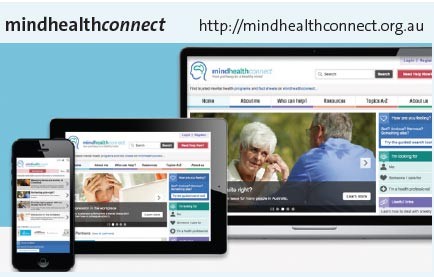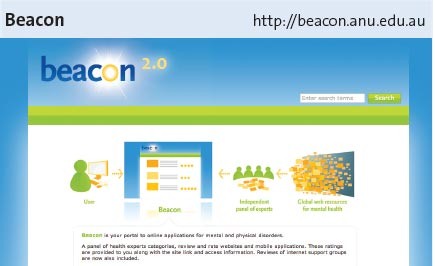Electronic communications are increasingly part of daily life and are being introduced into psychological practice in many ways. For example, there are numerous websites, Internet programs and apps for mental health and wellbeing. Therapy and counselling can also be provided over the telephone, videoconferencing or text media such as chat or email. Australian psychologists and their clients can access a rich array of online resources and apps but may feel somewhat bewildered by the sheer number available, especially for high prevalence disorders such as depression and anxiety. Two sites may be particularly helpful to psychologists who wish to use online mental health resources in their work.
mindhealthconnect
This website is designed to be a gateway mental health website for the public and health professionals, and is operated by Healthdirect Australia with funding from the Australian Government as part of its e-mental health strategy (Commonwealth Department of Health, 2012). The website can help psychologists and their clients find relevant mental health and wellbeing information and resources, assessment tools, treatment programs and services, helplines and other resources.
There is also a new dedicated section with a wide range of general and specific resources suitable for health professionals, including fact sheets and online programs across a range of disorders. This section will continue to grow in 2014.
The website offers multiple search options. For example, users may search by keyword, alphabetically or by resource type. For consumers, there is also a guided search option, which filters results based on how they are feeling, situations they have recently experienced and their Kessler-6 (K-6) psychological distress scale score. Users can specify whether they are searching for information for themselves or for other people. The website also allows users to filter results on dimensions such as age, gender, cultural background and location.
All current and future mindhealthconnect information partners must complete an assessment process produced in conjunction with corporate and clinical governance advisors, ensuring all the resources presented are from trusted and endorsed sources.

Beacon
This website helps users to find and assess the quality of e-health resources and is delivered by e-hub at The Australian National University with previous funding from the Commonwealth Department of Health. The site is designed for both consumers and health professionals and is divided into 40 categories based on mental and physical health conditions. Within each health category, resource listings are divided into websites and online services, apps, and online support groups.
Each listing includes detailed information about the resource and how to access it, and invites users to rate and comment on their experience of it. Beacon also reviews the outcome research for individual programs and apps, and each resource is awarded a rating based on the available research evidence for the intervention (Christensen et al., 2010). Online support groups are not rated because there is relatively little research to date. Instead, Beacon provides additional information about how each online support group is moderated, hosted and accredited.
Beacon users can search by keyword and health categories. Within each category, users can filter their search by specifying the target audience (e.g., adolescents), type of access (e.g., open with registration) and evidence base rating.
Beacon is available without registration but users can register an account (without charge) for additional functionality, such as being able to create a list of favourite sites for future reference.

The author can be contacted at [email protected]